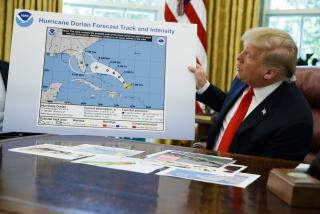Storm makes being anti-government awkward for GOP
ST. PETERSBURG, FLA. — Into the carefully scripted Republican convention has come a complication: a natural disaster that not only distracts attention from Mitt Romney but sets up a collision with a fundamental tenet of today’s GOP.
To a great extent, the Republican Party has defined itself as the anti-government party. The message that Washington is a problem and rarely, if ever, the solution was hugely successful in 2010 in response to President Obama’s expansive healthcare overhaul; the backlash helped Republicans win the House in a landslide and reduce Democrats to a tenuous majority in the Senate.
But that election, like every midterm vote, drew a much smaller turnout than would be typical of a presidential race. The question for Romney and the Republicans has always been whether the bigger, broader electorate this Nov. 6 will prove as receptive to the tea party message of cutting Washington off at its roots.
This week could be a test, if the wind and waters of Tropical Storm Isaac wallop the Gulf Coast as strongly as feared.
As storm trackers watched and waited for landfall, the role of the federal government has been much in evidence. The National Weather Service has been the unofficial voice of the convention, with its constant updates shaping not just the TV coverage but, behind the scenes, the deliberations of Romney strategists.
For those watching at home, the scenes from Tampa, Fla., have alternated with updates on the storm and accounts of the mobilization, with a strong assist from Washington, to evacuate tens of thousands of people and prepare relief efforts.
The Obama administration Monday issued a detailed accounting of preparations by the Federal Emergency Management Agency -- more than 1 million liters of drinking water, 436,000 meals, 2,000 cots, 4,600 blankets and other supplies stocked in warehouses in Alabama and Florida -- and made it known that the president was being briefed and had called Gulf Coast governors, all Republicans.
For all their budget-cutting ardor, most Republicans do not openly advocate the closure of, say, the National Hurricane Center or FEMA, though some have demanded that spending for disaster relief be offset by cuts elsewhere. But the budgets that Romney and Paul D. Ryan have advocated would force huge reductions in domestic programs, which would include those areas. The danger for them is that the response to Isaac will show government as less a problem than a solution.
And then there are what political professionals call the “optics.”
A Romney strategist envisioned an Obama tour of the Gulf Coast -- after the storm passes, of course -- and said the image of the president as consoler in chief would be “hard to beat. You don’t beat it.”
The politics of disaster relief can be tricky and as unpredictable as the weather.
As if to underscore the point, Isaac is expected to make landfall along the Gulf Coast of Louisiana or Mississippi on Wednesday, the seventh anniversary of Hurricane Katrina.
President George W. Bush, then early in his second term, never recovered from his administration’s haphazard response to the storm. While Romney has tried to scrub mention of Bush from his campaign, Isaac’s quirk of calendar and geography has drawn video of Katrina onto TV screens.
If mishandling a disaster is the risk facing an incumbent, for Romney the more immediate concern is what voters -- especially those tuning in to make up their minds -- take away from the now-truncated convention.
Fearing Isaac’s possible effects on the host city, Republican leaders canceled Monday’s opening day, save for a brief, perfunctory session, out of concern about transportation across the flood-prone causeways and bridges that crisscross the Tampa region.
That was the easy part. Collapsing four days of speakers into three will do little harm, except to the egos of politicians shunted aside or given less time in the spotlight.
The difficult programming decisions will have to be made over the next three days as the Romney campaign seeks to adjust its originally intended message, a mix of Obama-bashing and Romney-burnishing, to the images from outside the convention hall. Much will depend on Isaac and its impact.
Apart from the official business -- formally installing Romney and his running mate, Ryan of Wisconsin, as the GOP nominees, adopting the party platform, attending to other housekeeping -- conventions are in effect great big parties, and that could be a problem.
“There’s no question you can’t have cheering, happy people when somewhere in America something ghastly is happening,” said Fred Davis, a GOP strategist who orchestrated the convention program for the 2008 Republican nominee, Sen. John McCain of Arizona. That convention, in St. Paul, Minn., was also shortened by a day as Hurricane Gustav hit the Gulf Coast.
If Isaac fizzles into nothing more than heavy rain, “then you keep going,” Davis said. But “if the president is out there looking out for the people of the country, it’s not a good time for Republicans to be attacking.”
For their part, Romney strategists said they were moving forward with their intended program, with one eye carefully kept on Isaac and a readiness to make changes as needed.
They really have no choice, as nature has refused time and again to cooperate with even the best-laid plans.
--
paul.west@latimes.com
More to Read
Get the L.A. Times Politics newsletter
Deeply reported insights into legislation, politics and policy from Sacramento, Washington and beyond. In your inbox three times per week.
You may occasionally receive promotional content from the Los Angeles Times.










